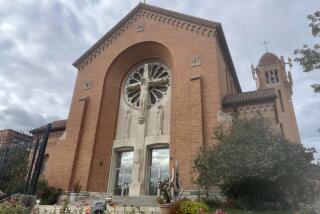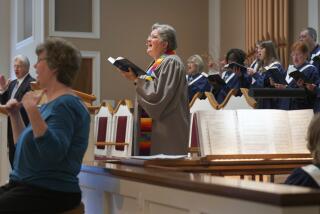Boston-Area Catholic Church Gets New Life
- Share via
WEYMOUTH, Mass. — For seven months, members of St. Albert the Great Roman Catholic Church staged a round-the-clock vigil, sleeping on wooden pews and praying that church leaders would reverse their decision to close the parish.
On Thursday, their prayers were answered as the archbishop of Boston agreed to reopen St. Albert’s.
“Jesus, Mary and Joseph!” said Mary O’Loughlin, a member of the parish for 35 years. “I can’t believe this. I never thought it would happen. I never thought the archbishop would change his mind.”
The red-brick church was one of 82 Boston-area parishes ordered closed last year as church officials struggled to cut costs after an $85-million settlement with hundreds of clerical sexual abuse victims.
Parishioners at dozens of churches wept as locks were placed on the doors. But before St. Albert’s could be closed, the faithful moved in and started a protest that was emulated at seven other parishes. A dozen more churches pressed the Boston Archdiocese to reverse its plans.
Archbishop Sean Patrick O’Malley announced Thursday that a reconfiguration review committee had concluded that six of the parishes would remain closed. Three others will merge with larger parishes but will remain open as chapels.
St. Albert the Great and a Newton parish will reopen.
O’Malley deferred judgment on the other parishes on the closure list.
“Committee members have helped me understand the concerns, the anger and the frustrations that have emerged from this reconfiguration process,” O’Malley said in a statement.
But he stopped short of allowing St. Albert parishioners in this working-class community 15 miles south of Boston to get back Father Ron Coyne, who staunchly supported their cause.
On the busy road in front of St. Albert’s, drivers honked in support. A garland of balloons was strung over the front steps, white for peace and yellow for power, said Zako Hajjar, a second-generation parishioner.
Church members hugged one another, and a quartet burst into song, booming out “Happy Days Are Here Again.”
Mary Akoury, president of the parish council, said protesters had vowed to occupy the church indefinitely.
“We said from Day One that this was an unjust and unfair decision on the part of the archdiocese,” she said. “And now the archdiocese has changed its mind. Today many parishioners, including myself, have said: ‘Miracles do happen.’ ”
On weekends, more than 400 people typically turned out for prayer services that lacked only a priest to qualify as a Mass. Communion wafers were served, and parishioners read homilies.
During the course of the vigil, St. Albert’s introduced activities such as ballroom dancing classes and movie nights for families, who bunked on inflatable mattresses spread out in front of the altar after the last reel was done.
Peter Meade and Sister Janet Eisner, members of O’Malley’s review committee, said Thursday that they had attended prayer sessions at St. Albert’s during their visits to churches that were closed or scheduled to be closed.
“We were very moved,” Meade said. “Sister Janet and I came out, and she said, ‘What faith.’ ”
He added: “We saw it, and we felt it.”
At the parish, Maryanne Gottfried said she spent seven months bringing her laptop computer to church so she could work as a medical writer while she held vigil.
“The church leaders admitted that they made a mistake,” she said Thursday. “They saw that we had no signs of letting up, and they gave in.”
Gottfried, 46, said the determination of parishioners at St. Albert’s sent an important message to church leaders. She said the era of “pray, pay and obey” had come to an end.
“We didn’t roll over, we didn’t go along with what they told us like good little Catholics,” she said. “After the priest abuse scandal, it was not the same. And it never will be.”
Voice of the Faithful -- a group formed at the outset of the sexual abuse scandal that urged increased participation by laypersons -- lamented that other parishes were not reopened.
“These parishes, many of whom have sustained 24-hour vigils for months, have proven a sincere commitment to their faith communities,” said Mike Gustin, chairman of the steering committee for the group’s Boston council.
“It is disappointing that the archdiocese has not found a way to keep all of these vibrant parish communities open.”
More to Read
Sign up for Essential California
The most important California stories and recommendations in your inbox every morning.
You may occasionally receive promotional content from the Los Angeles Times.










